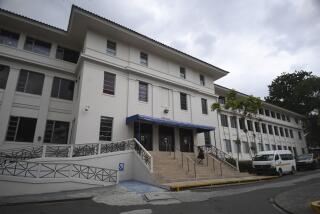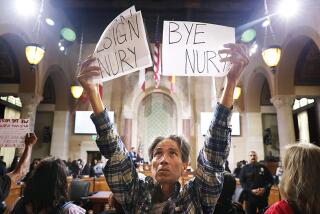China censors media coverage about the ‘Panama Papers’
- Share via
Reporting from Beijing — On Monday morning, when news spread that a trove of leaked documents had revealed the offshore holdings of the global elite, Chinese media joined their international counterparts in reporting the “biggest leak in history.”
The Chinese reports were cautious — they did not mention that the leak, dubbed the “Panama Papers,” named several top Chinese officials, including President Xi Jinping. But that didn’t stop the censors. That afternoon, Chinese authorities issued a circular demanding that the articles be taken down. By Tuesday, it was as if they’d never existed.
“Find and delete reprinted reports on the Panama Papers,” demanded one provincial propaganda department, according to a circular leaked on Tuesday by the California-based news website China Digital Times. “Do not follow up on related content, no exceptions. If material from foreign media attacking China is found on any website, it will be dealt with severely.”
The Panama Papers comprise the biggest leak in history, involving 11.5 million documents from Panama-based Mossack Fonseca, the world’s fourth biggest offshore law firm. The documents implicate a dozen current or former heads of state, as well as scores of other politicians, celebrities and businesspeople, in owning offshore accounts that could help them conceal their wealth or avoid taxes.
Reporting on the leak involved more than 370 journalists in 76 countries, and was coordinated by the Washington-based International Consortium of Investigative Journalists (ICIJ).
According to several media outlets that reported on the documents, the family members of eight current or former top-level Chinese officials have held offshore companies, including Xi’s brother-in-law Deng Jiagui.
China’s Foreign Ministry spokesman Hong Lei brushed off questions about the Panama Papers at a regularly-scheduled press briefing on Tuesday. “For such groundless accusations I have no comment,” he said.
See more of our top stories on Facebook >>
China, a nominally Communist country racked by some of the world’s worst income inequality, keeps the financial affairs of its top leaders a closely-guarded secret. In 2012, censors blocked the websites of Bloomberg and the New York Times after they published investigations into the fortunes accumulated by family members of the country’s political elite.
Since Xi became the country’s top leader in late 2012, he has overseen the most intensive anti-corruption campaign in recent history, ensnaring tens of thousands of officials from every level of the Communist Party hierarchy.
The Panama Papers are “evidence that the anti-corruption campaign, on which [Xi’s] reputation stands, is actually less thoroughgoing than he has claimed,” said Willy Lam, an expert on elite Chinese politics at the Chinese University of Hong Kong.
Lam added that although the financial dealings of Xi’s brother-in-law come as no surprise — the New York Times documented them in 2014 — the leak could still effect Xi’s standing. In recent weeks, a spate of open letters and domestic media articles criticizing Xi have suggested growing resistance to his authoritarian leadership style.
“The timing of this is significant, in that Xi’s enemies, who are still lurking beneath the airwaves — and who we cannot exactly identify — can use this,” Lam added. “This seems to be a god-sent opportunity to use against Xi Jinping.”
By Tuesday afternoon, only one Chinese media article about the scandal remained easily searchable online: an editorial by the English-language version of the Global Times, a nationalistic state-run tabloid, which framed the leaks as an ideologically-motivated attack by the West. The editorial focused on allegations against Russian President Vladimir Putin, and did not mention that Chinese officials were implicated.
“The Western media has taken control of the interpretation each time there has been such a document dump, and Washington has demonstrated particular influence in it,” it said. “Information that is negative to the U.S. can always be minimized, while exposure of non-Western leaders, such as Putin, can get extra spin.”
A Chinese version of the editorial has been taken offline.
Elsewhere on the Chinese internet, discussion of the leaks was strictly censored. On Tuesday, searches for “Deng Jiagui” on Weibo, a popular Twitter-like microblog, yielded no results. On Zhihu, China’s Quora-like forum, a thread titled “Who are the people of interest in the Panama Papers leaks?” was deleted in its entirety.
Searches for “Panama Papers” on Baidu, China’s leading search engine, produced the response: “the search results do not conform with relevant rules and policies, so they are not displayed. Please try other key words.”
Yingzhi Yang and Nicole Liu in the Times’ Beijing bureau contributed to this report.
MORE ON THE PANAMA PAPERS
Five key figures implicated in the ‘Panama Papers’ scandal
After massive ‘Panama Papers’ document leak, rich and powerful around the world deny wrongdoing
Panama Papers expose Pakistan’s embattled prime minister to allegations of corruption
More to Read
Sign up for Essential California
The most important California stories and recommendations in your inbox every morning.
You may occasionally receive promotional content from the Los Angeles Times.













